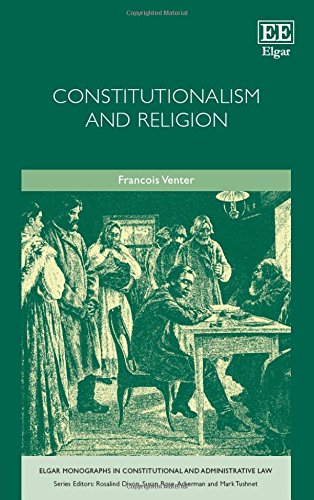

Most ebook files are in PDF format, so you can easily read them using various software such as Foxit Reader or directly on the Google Chrome browser.
Some ebook files are released by publishers in other formats such as .awz, .mobi, .epub, .fb2, etc. You may need to install specific software to read these formats on mobile/PC, such as Calibre.
Please read the tutorial at this link: https://ebookbell.com/faq
We offer FREE conversion to the popular formats you request; however, this may take some time. Therefore, right after payment, please email us, and we will try to provide the service as quickly as possible.
For some exceptional file formats or broken links (if any), please refrain from opening any disputes. Instead, email us first, and we will try to assist within a maximum of 6 hours.
EbookBell Team

4.0
96 reviews'Constitutional arrangements relating to the relationship between religion and the law have over the years reflected a rich variety, ranging from the separation of religion and the law to the identity of religion and the law. Constitutionalism and Religion records the rich varieties of constitutional arrangements of religion in many countries of the world and in respect of a great variety of pragmatic features of our day-to-day lives, such as education, labour relations and the display of religious symbols.'
- Johan D. van der Vyver, Emory University School of Law, US
'Francois Venter's study of Constitutionalism and Religion is a major contribution to the understanding of church-state relations in the modern age. This global comparative exploration of how governments need to engage with twenty-first century religious pluralism is refracted through the prism of the author's informed critique of the challenges faced in post-apartheid South Africa. This book is a handy road map when travelling through potentially hostile territory.'
- Mark Hill QC, University of Pretoria, South Africa
This topical book examines how the goals of constitutionalism - good and fair government - are addressed at a time when the multi-religious composition of countries' populations has never before been so pronounced. How should governments, courts and officials deal with this diversity? The widely accepted principle of treating others as you wish them to treat you and the universal recognition of human dignity speak against preferential treatment of any religion. Faced with severe challenges, this leads many authorities to seek refuge in secular neutrality. Set against the backdrop of globalized constitutionalism in a post-secular era, Francois Venter proposes engaged objectivity as an alternative to unachievable neutrality.
Bringing together the history of church and state, the emergence of contemporary constitutionalism, constitutional comparison and the realities of globalization, this book offers a fresh perspective on the direction in which solutions to difficulties brought about by religious pluralism might be sought. Its wide-ranging comparative analyses and perspectives based on materials published in various languages provide a clear exposition of the range of religious issues with which the contemporary state is increasingly being confronted.
Providing a compact but thorough historical and theoretical exposition, this book is an invaluable resource for students, constitutional scholars, judges and legal practitioners.